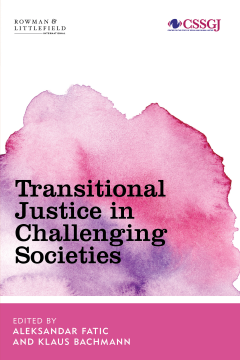
BOOK
Transitional Justice in Troubled Societies
Aleksandar Fatic | Klaus Bachmann | Igor Lyubashenko
(2018)
Additional Information
Book Details
Abstract
This book discusses the crucial strategic topic for the practical implementation of transitional justice in post-conflict societies by arguing that the dilemma is defined by the extent to which the actual achievement of the political goals of transition is a necessary condition for the long-term observance and implementation of justice.
While in many cases the ‘blind’ criminal justice does not enhance, and even militates against, the achievement of political transitions, an understanding of transitional justice as a fundamentally political process is novel, controversial and a concept which may shape the future of transitional justice.
This collection contributes to developing this concept both theoretically and through concrete and current case studies from the worlds most pronounced crisis spots for transitional justice.
Aleksander Fatic is Research Professor of Philosophy at the Institute for Philosophy and Social Theory, University of Belgrade, Serbia.
Klaus Bachmann, Professor of Political Science at SWPS University, Warsaw, Poland, specializes in transitional justice, the politics of dealing with the past and modern European history. University of Belgrade, Serbia.
Table of Contents
| Section Title | Page | Action | Price |
|---|---|---|---|
| Cover | Cover | ||
| Half Title | i | ||
| Series Information | ii | ||
| Title Page | iii | ||
| Copyright Page | iv | ||
| Contents | v | ||
| Introduction: TransitionalJustice as Conflict-Resolution, Aleksandar Fatić | 1 | ||
| 1 Transitional Justice and Injustice in Transition: Assessing the Penalisation of Wartime Violence in Light of the ICTY Legacy | 59 | ||
| 2 Transitional Justice, Democracy and the Justification of State Coercion | 81 | ||
| 3 Organised Crime as a Challenge to Transitional Justice | 101 | ||
| 4 Economic Justice and Economic Efficiency in Postconflict Societies in Transition | 123 | ||
| 5 Fighting Impunity or Containing Occupiers: How the Ukrainian Self-Referrals Reshape the ICC’s Role in International Relations | 143 | ||
| 6 The Political Economy of Transitional Justice in Ukraine | 161 | ||
| 7 Historical Justice, National Identity and Memory in Contemporary Ukraine | 177 | ||
| 8 Romanian Transitional Criminal Justice: The Story of Four Trials and a Failure | 197 | ||
| 9 A Theory of National Reconciliation: Some Insights from Africa | 213 | ||
| Aboutthe Contributors | 239 | ||
| Index | 237 |
